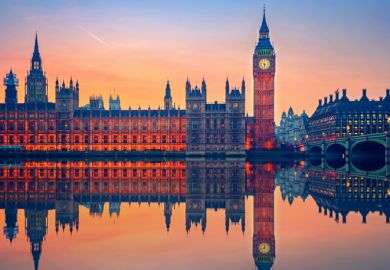The late-stage draft of England's campus speech bill is light on academic rights, leaving university governing bodies to define notions of intellectual autonomy and free expression on their campus, senior sector figures have argued.
The House of Lords again tweaked the Westminster government’s Higher Education (Freedom of Speech) Bill on 21 March, with Conservative former universities minister Lord Willetts telling an event at King’s College London that peers had added “some constraints” to a controversial mechanism for suing universities and students’ unions that limit speech, such as requiring all regulatory remedies to be tried first.
The bill, which entered Parliament in May 2021, will put each university’s governing bodies in the “hugely influential” position of balancing the roles of free speech and academic freedom on campus, said Nicola Dandridge, professor of practice in higher education policy at the University of Bristol and former head of university watchdog the Office for Students.
“The approach of the university is going to be really fundamental. It won’t just influence the regulator; it will influence the courts as well,” she said, adding that universities must have a “very clear conception” of scholarly freedom and the related but not identical concept of free speech if they were to reverse the “subordination” of academics’ free speech rights as enshrined by university statutes.
While she backed the bill and the responsibility it would place on universities, Professor Dandridge said taking subtle considerations like the quality of a scholar’s views – such as whether they taught outdated or intellectually unsound ideas – into a legal rather than regulatory frame would be “really challenging”.
Favouring individual speech over disciplinary consensus could heighten conflicts, Lord Willetts continued. He gave the example of an environmental scientist who wanted to teach that man-made carbon emissions drive climate change.
“What if he or she says, ‘I have a right of freedom to speak as an academic, reinforced by this legislation, and you are getting rid of me because of my opinions’? – and in a way, he is being got rid of because of his opinions. His opinions are not thought to be part of the settled shape of a discipline,” said Lord Willetts.
Naomi Waltham-Smith, a philosopher at the University of Warwick and elected chair of its academic freedom review committee, also had strong reservations about the bill. She said it “doesn’t simply reduce academic freedom to freedom of expression”, but “more dangerously confuses or erodes the boundaries between the two”.
Rather than thinking of academic freedom as expression within disciplinary boundaries, she said it should cover “that which is amenable to critique and rebuttal”. She contrasted its position in the bill with the hierarchy of speech used by the European Court of Human Rights, which gives academic freedom the highest level of protection of all expression.
If the UK were to leave the European Convention on Human Rights, neither the free speech bill nor a replacement Bill of Rights bill would be enough to protect academic freedom, she said, which could be “dissolved into a free-for-all of expression and opinion”.
Professor Waltham-Smith, who has studied and taught at the University of Pennsylvania and at Indiana University, said proposed state laws in Florida showed the risk of “elevating free speech as something that should take priority on university campuses”.
There were disagreements about whether students should fall under the protection of academic freedom, although some panellists thought they should be involved in its definition on UK campuses. Frans Berkhout, professor of environment, society and climate at King’s, said working in a time of knowledge “co-production” with students and society suggested that academic freedom should apply more broadly.
Professor Waltham-Smith said it was important that institutional definitions of academic freedom and speech enabled criticism of the university and the wider higher education system, even when this brings the institution into disrepute.
While there is a diversity of definitions available in the US and continental Europe, there was enough commonality for UK institutions to draw on them, she said, adding that it was not a problem if debates arose from doing so. “It would be precisely part of academic freedom to question and test the definition.”
Register to continue
Why register?
- Registration is free and only takes a moment
- Once registered, you can read 3 articles a month
- Sign up for our newsletter
Subscribe
Or subscribe for unlimited access to:
- Unlimited access to news, views, insights & reviews
- Digital editions
- Digital access to THE’s university and college rankings analysis
Already registered or a current subscriber?






